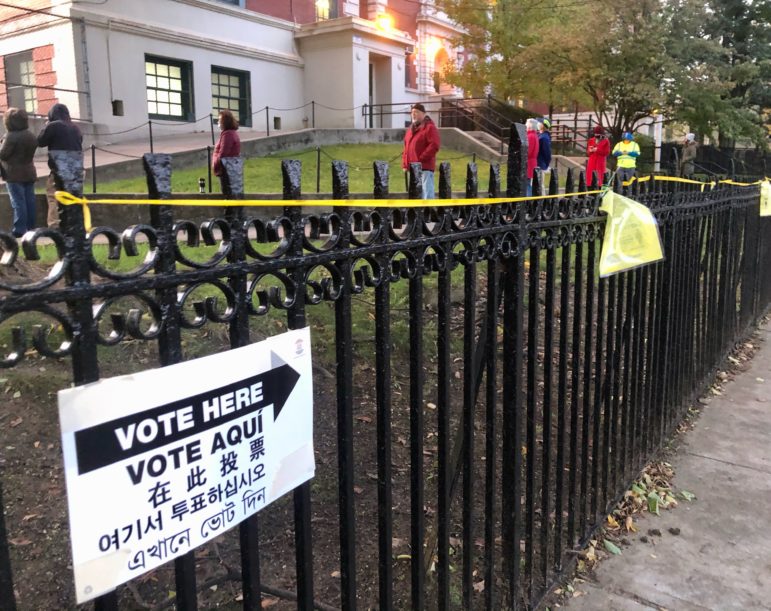‘Failing to pay serious attention to Asian American candidates and voters is a mistake. There are 1.3 million AAPI New Yorkers who make up 15 percent of the city’s population.’

Jeanmarie Evelly
Voters line up in Queens during the November 2020 election.Following the 2020 election, we saw one story making headlines: Asian Americans and Pacific Islanders (AAPIs) across the country were turning out to vote in record numbers, often the deciding vote in swing states. Across the board, AAPI voter turnout more than doubled from 2016 and 2020. In Georgia, the AAPI vote increased nearly 500 percent.
This was not a coincidence. A powerful force is behind this surge—and that’s the rise in AAPI leadership as community organizers, candidates, and elected officials locally.
Having worked on presidential, gubernatorial, and City Council campaigns the past 15 years, I have seen changes in the politicization of AAPIs and AAPI leaders stepping into the public space across the country, and in our own city, to face the rise in Asian hate during the pandemic. More AAPIs have gotten involved in political campaigns, fundraisers, rallies, and civic education.
The driver behind the increased political engagement of AAPIs? It’s Asian American and Pacific Islander leaders. Look what is happening in New York.
I have organized alongside incredible AAPI leaders to raise awareness on issues, mobilize voters, and protect our community. As great coalition builders, these leaders are strategic, collaborative, and tireless. We organize block parties, mosque and church visits, business leaders roundtables, ethnic media buys, phone banks in multiple languages, chai and chats, and voter mobilization on our social media platforms—WeChat, KakaoTalk, and WhatsApp.
In the past two years, in the face of COVID-19, another wave of strong, existing and new AAPI voices rose up at anti-hate rallies, virtual fundraisers for Chinatown restaurants, PPE donations to frontline workers from nail salons, free Lyft/cab rides for older and women Asian American New Yorkers, and vigils and prayer rallies for the survivors of hate crimes.
We are set to have six Asian American City Council members, five of whom are women: Felicia Singh, Sandra Ung, Shekar Krishnan, Julie Won, Shahana Hanif, and Linda Lee. Sadly, during the primaries, support from powerful PACs and organizations for Asian American newcomers running for City Council this year was limited, with their endorsements focused on candidates with established political ties.
That’s why the foundation for New York’s Asian American political leadership has been critical—it was set in place by trailblazers like Congresswoman Grace Meng, State Senator John Liu, State Assembly Members Ron Kim and Yuh-line Niou, and City Council Members Margaret Chin and Peter Koo.
But failing to pay serious attention to Asian American candidates and voters is a mistake. There are 1.3 million AAPI New Yorkers who make up 15 percent of the city’s population. Long Island City has the fastest growing AAPI population, and AAPIs are the fastest growing racial group in New York City. Asian American New Yorkers planned to vote in the general election more than the average New Yorker.
AAPI community organizing, AAPI candidates that look like us, and the community’s response to tragedy have contributed to increased voter engagement. According to the 2020 Asian American Voter Survey, more than half of registered Asian Americans in New York City said that they were more enthusiastic than usual about voting in the presidential election. Asian American registered voters are fired up.
And yet there is still work to be done. The same survey showed that 60 percent of Asian American New Yorkers were “not contacted at all” by either political party. This was almost 8 percentage points higher than Asian Americans in California, another safe, blue state.
The bottom line here? Despite significant AAPI population growth, AAPIs helping to win elections in many states across the country, and an unprecedented number of AAPIs in federal, state, and local elected positions, we continue to be underestimated and underinvested in.
The AAPI community must be a critical player in any political leaders’ or organizations’ strategies. Hire us. Court us. Vote for us. As we close out Election Day, we cannot take for granted the AAPI vote, our voice, and our power.
Grace Choi leads the New York Chapter of the Coalition of Asian American and Pacific Islander Churches and previously led efforts on racial equity and inclusion in COVID-19 response, mental health, and gender equity as the director of policy in the New York City Mayor’s Office. Since 2006, she has worked on presidential, gubernatorial, and city council campaigns, including in New York, Boston, Virginia, and Georgia, including serving as director of AAPI outreach for Stacey Abrams for Governor.









